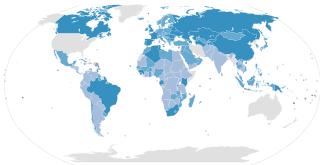Related Research Articles

The Vienna Convention on the Law of Treaties (VCLT) is an international agreement that regulates treaties among sovereign states; the VCLT is a codification of customary international law and state practice concerning treaties.

The ILO Convention Concerning Minimum Age for Admission to Employment C138, is a convention adopted in 1973 by the International Labour Organization. It requires ratifying states to pursue a national policy designed to ensure the effective abolition of child labour and to raise progressively the minimum age for admission to employment or work. It is one of eight ILO fundamental conventions. Convention C138 replaces several similar ILO conventions in specific fields of labour.
Protection against Accidents (Dockers) Convention (Revised), 1932 is an International Labour Organization Convention.
The Freedom of Association and Protection of the Right to Organise Convention (1948) No 87 is an International Labour Organization Convention, and one of eight conventions that form the core of international labour law, as interpreted by the Declaration on Fundamental Principles and Rights at Work.
The Right to Organise and Collective Bargaining Convention (1949) No 98 is an International Labour Organization Convention. It is one of eight ILO fundamental conventions.
Invalidity, Old-Age and Survivors' Benefits Convention, 1967 is an International Labour Organization Convention.
Fee-Charging Employment Agencies Convention (Revised), 1949 is an International Labour Organization Convention.
Occupational Safety and Health Convention, 1979 is an International Labour Organization Convention.
Maternity Protection Convention, 2000 is an International Labour Organization Convention.
Migration for Employment Convention (Revised), 1949 is an International Labour Organization Convention for migrant workers.
Accommodation of Crews Convention (Revised), 1949 is an International Labour Organization Convention.
Final Articles Revision Convention, 1946 is an International Labour Organization Convention.
Final Articles Revision Convention may refer to either of two International Labour Organization conventions:
The Indigenous and Tribal Peoples Convention, 1989 is an International Labour Organization Convention, also known as ILO Convention 169, or C169. It is the major binding international convention concerning indigenous peoples and tribal peoples, and a forerunner of the Declaration on the Rights of Indigenous Peoples.
Labour Statistics Convention, 1985 is an International Labour Organization Convention.
Occupational Health Services Convention, 1985 is an International Labour Organization Convention.
Chemicals Convention, 1990 is an International Labour Organization Convention.

The Maritime Labour Convention (MLC) is an International Labour Organization (ILO) convention, number 186, established in 2006 as the fourth pillar of international maritime law and embodies "all up-to-date standards of existing international maritime labour Conventions and Recommendations, as well as the fundamental principles to be found in other international labour Conventions". The other pillars are the SOLAS, STCW and MARPOL. The treaties applies to all ships entering the harbours of parties to the treaty (port states), as well as to all ships flying the flag of state party (flag states, as of 2021: over 91 per cent).
The right to sit refers to laws or policies granting workers the right to be granted suitable seating at the workplace. Jurisdictions that have enshrined "right to sit" laws or policies include the United Kingdom, Jamaica, South Africa, Eswatini, Tanzania, Uganda, Lesotho, Malaysia, Brazil, Israel, Ireland, the Indian states of Tamil Nadu and Kerala, the Canadian province of Newfoundland and Labrador, and the British overseas territory of Gibraltar and Montserrat. Almost all states of the United States and Australia, as well as the majority of Canadian provinces passed right to sit legislation for women workers between 1881 and 1917. US states with current right to sit legislation include California, Florida, Massachusetts, Montana, New Jersey, New Mexico, New York, Oregon, Pennsylvania, West Virginia, and Wisconsin. A right to sit provision is included in the International Labour Organization's Hygiene Convention, 1964; the convention being ratified by 51 countries as of 2014. Local jurisdictions with right to sit laws include Portland, Oregon, St. Louis, Missouri and London's Royal Borough of Kensington and Chelsea. Some jurisdictions, such as Alabama, Arkansas, Connecticut, Idaho, Kentucky, Maine, Michigan, Missouri, Nevada, New Hampshire, Quebec, and Washington, D.C. have revoked their right to sit laws. Many right to sit laws originally contained gendered language specifying women workers only. Some jurisdictions maintain gendered laws, but many jurisdictions have amended their right to sit laws to be gender neutral.